Every Monday during the fall semester, film, theatre and audio producer David Treatman (Puffs) hopped on a plane from New York City to Austin and then boarded a return flight the next morning. His purpose behind making these trips? To co-teach a Department of Theatre and Dance course with Dr. Paul Bonin-Rodriguez, entitled “The Business of Self-Marketing.” Both Bonin-Rodriguez and Treatman are well versed in entertainment production and the tenacity needed to advocate for new works. After co-producing on a project together, Bonin-Rodriguez knew that Treatman would be an excellent educator for our UT students, and plans to co-teach a course in the fall of 2023 began taking shape. We spoke with Treatman and Bonin-Rodriguez about their professional work, what led them to co-teaching this fall and their experiences working with undergraduate students.
Paul, how did you end up co-teaching a course with David Treatman? How did you meet him, and what led you both towards teaching this course?
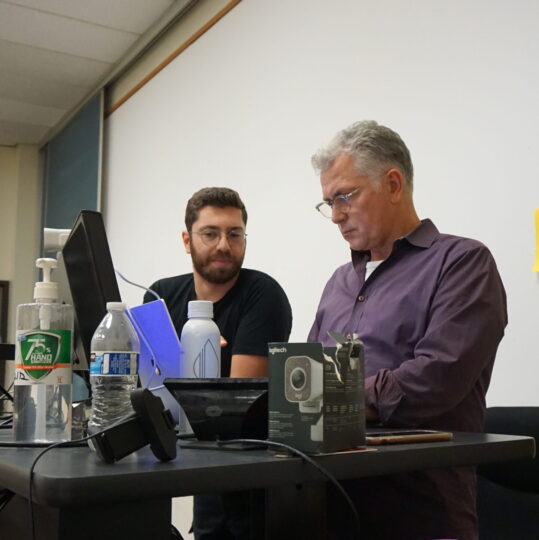
Paul Bonin-Rodriguez: I met David (over the phone) in late summer 2022 through a friend and colleague who invests in theatre and film. The phone call was essentially a pitch meeting. David was looking for support for a live capture of an Audra McDonald concert at the London Palladium. He made a good case for the project and answered all of my questions. After some more meetings, I signed on and attended the concert in September 2022. The day after the concert, David invited me and our mutual friend to the studio to view the footage and discuss the process for the edit. He continued to send “drafts” of the concert as it was being edited. I have a background in television production – from way back – so it was a pleasure to go through each version and make notes. David was very open about process and encouraging of feedback. He’s a pleasure to work with.
In October, David and I met in New York for breakfast, and he indicated his desire to teach and share his knowledge. I thought then, and I know now, that there is a value to having the students learn from someone who is closer to their age – someone who has enjoyed success earned through hard work and strategic learning on the job during those first few years after college. He has tremendous business and people skills. In spring 2023, professor Megan Alrutz, who was serving as Interim-Chair of the Department of Theatre and Dance at the time, encouraged me to invite David to campus to meet with students, and he demonstrated his skills in the classroom. Because I had led the Minor in Arts Management and Administration (MAMA) for its first four years, I felt that there was a place for the type of class he wanted to offer – one focused on commercial production.
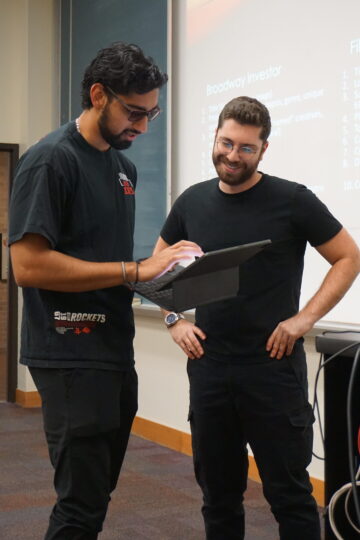
David, what made you decide to co-teach this class with Paul? What has the co-teaching experience been like?
David Treatman: Co-developing and co-teaching this course with Dr. Paul Bonin-Rodriguez has been the joy of my year. I have always had a drive to educate and empower young creatives to produce their work and to do. Dr. Paul’s research in the construction and importance of artist networks and his grounding expertise in teaching were the perfect complements to accomplish the goal: empower young creatives to enter the world of commercial entertainment with the tools to set themselves up for financial success and protection. Every student in the class now has the foundation to think of themselves and their artistic/entrepreneurial pursuits as a business and to navigate complicated webs of contracts, egos and pitfalls exposed from our combined real-world experiences in the space.
How did you first get involved with producing theatre?
David Treatman: My first experience with producing theatre was for my senior project in high school. I wanted to produce and direct The 39 Steps, but my school outside of Philadelphia was deemed too close to New York City, and I was denied the rights. The show was then running off-Broadway a mere 86 miles away – close enough to be competition, licensing rules dictated. After I failed to convince the employee at Samuel French that I couldn’t possibly impact the show’s ticket sales in New York, I wrote to the producer of the New York production to plead my case. He put me in touch with the London-based rights holders, who I was able to demonstrate my love of the piece to and my clear business assessment that I would not detract from their sales. With their blessing, I was pinged back to a prominent entertainment attorney in New York, who wrote to Samuel French, who gave me a special dispensation to put on my scholastic production.
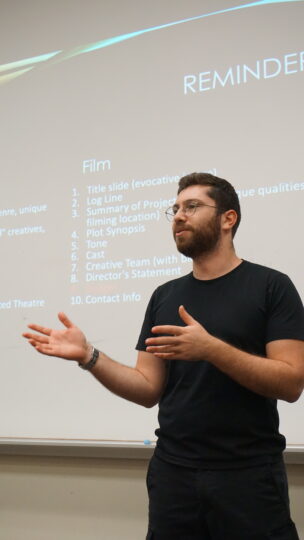
When I moved to New York City to go to college, I learned about an up and coming play from a friend, and we talked our way on the producing team for the off-Broadway production. The negotiation skills I learned on my student project proved indispensable as we argued our terms on the show, the attorney I’d corresponded with became my lawyer and the New York producer of The 39 Steps agreed to go to lunch with me and answer my questions about the industry. This was the beginning of learning what I didn’t know: that nobody knows what they are doing; that even though you don’t know, you just have to start doing and that if you just keep showing up, eventually you’ll show up in the right place and meet the right people.
Tell us about one or two of your favorite projects from throughout your career.
David Treatman: Puffs, or Seven Increasingly Eventful Years at a Certain School of Magic and Magic will forever hold a special place in my heart, both as the first professional play I ever produced, a wonderful work of art and as the success that I was able to parlay into a full-service production company. A hit has door-opening potential that I could never have replicated inorganically. Being labelled as a producer of such a hilarious and unexpectedly insightful play enabled everything that followed. Puffs continues to delight audiences and develop performers as a top scholastic licensing title.
Paul, talk a bit about your own experience with producing. How do you and David bring unique perspectives surrounding this topic?
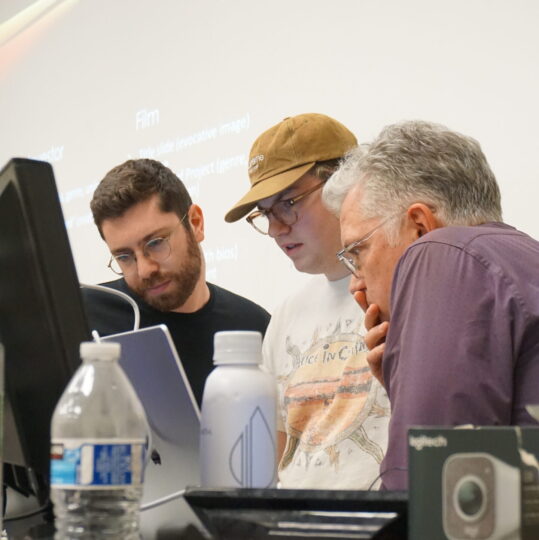
Paul Bonin-Rodriguez: My first book, Performing Policy, focused on how contemporary arts markets have forced artists to become producers of their work. That was my background as a writer-performer working largely in the nonprofit sector, though I did have some work optioned for commercial production. At UT, because of my work with the MAMA and because my research focuses on systems of support for artists and arts workers, I have been focused on building courses focused on professional development. David’s teaching – indeed, David himself – makes producing and development so accessible.
Talk about the experience of working with students on this course. Were there any “a-ha!” moments you witnessed throughout the class?
David Treatman: I was thoroughly impressed by the students at UT. The energy and attention that was brought to class made for deep discussions and engagement with course materials and each other. Several of our class sessions were devoted to parsing contracts, and a goal on the syllabus was that students would be able to demystify legalese in a contract negotiation. This section of the semester was very important to Dr. Paul and to me. This is one of the most important skills any of our students could pick up in the course of the semester, but it is also the most daunting, and I feared that it would be boring or turn students off. I watched with delight as student after student burst with excitement at having unlocked the language in front of them, and came away with the vocabulary to go forth in their professional lives with the skills and passion to read things that they are expected to sign – a quality too rare in entertainment!
Paul Bonin-Rodriguez: One day, David wanted to go through the 20 clauses of an “Option Purchase Agreement” paragraph by paragraph. The agreement/contract is 18 pages long. I thought, “There is no way that the students are going to sit through this for 3 hours.” I was wrong. The students were engaged, and also very insightful. They read the contracts closely and expressed their excitement about deciphering and mastering the document. They did the same thing when they developed their recoupment schedules for their Broadway pitch decks. Recoupment schedules project how many weeks it will take for a Broadway show to get a return on its investment and what percentage of audience capacity. The students hacked the formulas and excitedly applied that knowledge to their pitches. We are a production heavy department. Through this class, I felt we contributed additional, helpful knowledge about production. David has expressed a desire to continue working at and with UT through its work in New York, but also by supporting production. I hope we can make that happen.
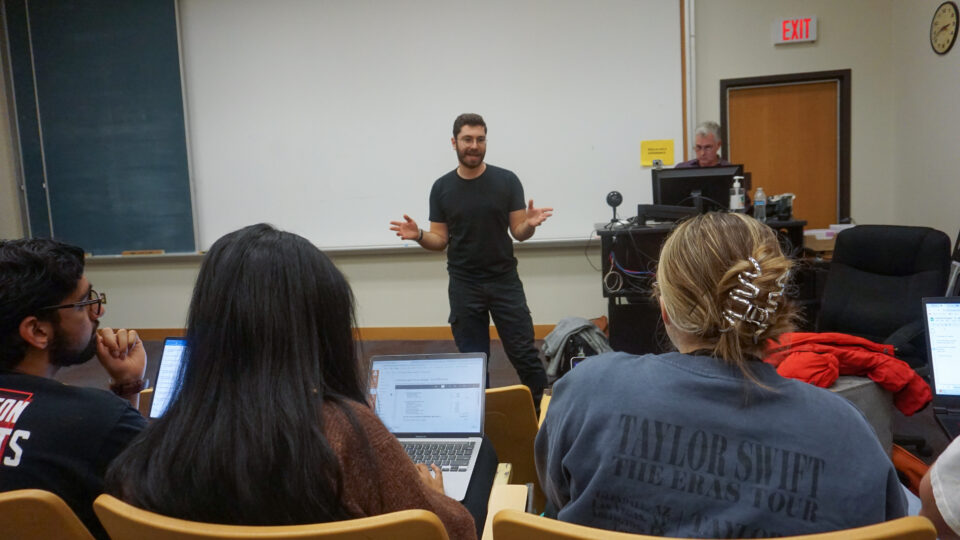
David, what are some lessons you’ve learned throughout your career that you share in this class?
David Treatman: This class included many moments of raw, tell-all truth about common issues in the world of entertainment. Entertainment attracts some of the best meaning, and some of the worst meaning people in the world. For any students who know that their calling is in the arts, this class hoped to tell them all of the mistakes I’ve made, so that I can save them heartache, time and legal fees as they venture into the industry themselves. My philosophy on effective communication in good times and in bad, inspired by my experiences, parenting books (which ended up on our syllabus), and other people in the space, is likely the most important section of the course, in my opinion.
Written by Sydney Pattillo.

